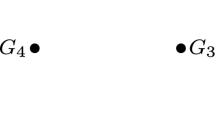Abstract
We present a new method to bound the cardinality of product sets in groups and give three applications. A new and unexpectedly short proof of the Plünnecke-Ruzsa sumset inequalities for commutative groups. A new proof of a theorem of Tao on triple products, which generalises these inequalities when no assumption on commutativity is made. A further generalisation of the Plünnecke-Ruzsa inequalities in general groups.
Similar content being viewed by others
References
W. Gowers: A new way of proving sumset estimates, Blogpost, available online at http://gowers.wordpress.com/2011/02/10/a-new-way-of-proving-sumset-estimates/.
A. Granville: An introduction to additive combinatorics, In: Additive Combinatorics, CRM Proceedings & Lecture Notes (New York, 2007), A. Granville, M. Nathanson, and J. Solymosi, Eds., American Mathamatical Society, 1–27.
H. Helfgott: Growth and generation in SL 2(ℤ/pℤ), Ann. of Math. 167 (2008), 601–623.
J. Malouf: On a theorem of Plünnecke concerning the sum of a basis and a set of positive density, J. Number Theory 54 (1995), 12–22.
G. Petridis: Upper bounds on the cardinality of higher sumsets, Preprint, available online at arXiv:1101.5001v2, submitted to Acta Arith.
H. Plünnecke: Eigenschaften und Abschätzungen von Wirkungsfunktionen, Berichte der Gasellschaft für Mathematik und Datenverarbeitung, Bonn, 1969.
H. Plünnecke: Eine zahlentheoretische anwendung der graphtheorie, J. Reine Angew. Math. 243 (1970), 171–183.
I. Ruzsa: On the cardinality of A+A and A-A, In: Combinatorics (Keszthely 1976) Coll. Math. Soc. J. Bolyai, vol 18 (1978), A. Hajnal and V. Sós, eds., North-Holland-Bolyai Társulat, 933–938.
I. Ruzsa: An application of graph theory to additive number theory, Scientia, Ser. A 3 (1989), 97–109.
I. Ruzsa: Addendum to: An application of graph theory to additive number theory, Scientia, Ser. A 4 (1990/1991), 93–94.
I. Ruzsa: An analogue of Freiman’s theorem in groups, Astérisque 258 (1999), 323–326.
I. Ruzsa: Cardinality questions about sumsets, In: Additive Combinatorics, CRM Proceedings & Lecture Notes (New York, 2007), A. Granville, M. Nathanson, and J. Solymosi, Eds., American Mathamatical Society, 195–205.
I. Ruzsa: Sumsets and structure, In: Combinatorial Number Theory and Additive Group Theory, Springer, New York, 2009.
I. Ruzsa: Towards a noncommutative Plünnecke-type inequality, In: An Irregular Mind Szemeredi is 70, Bolyai Society Mathematical Studies, Vol. 21 (New York, 2010), I. Bárány and J. Solymosi, Eds., Springer, 591–605.
T. Tao: Product set estimates for non-commutative groups, Combinatorica, 28 (2008), 547–594.
T. Tao, and V. Vu: Additive Combinatorics, Cambridge University Press, Cambridge, 2006.
Author information
Authors and Affiliations
Corresponding author
Rights and permissions
About this article
Cite this article
Petridis, G. New proofs of Plünnecke-type estimates for product sets in groups. Combinatorica 32, 721–733 (2012). https://doi.org/10.1007/s00493-012-2818-5
Received:
Published:
Issue Date:
DOI: https://doi.org/10.1007/s00493-012-2818-5



